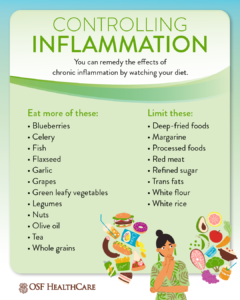
What you should know about inflammation
We’re all familiar with inflammation.
Sometimes you can see it. Sprain your ankle, and it swells. Burn your hand while cooking, and it turns red.
Other inflammation, you can’t see. Eat food that disagrees with your digestive system, and your stomach aches. Inhale smoke or other toxins, and your throat burns or you have trouble breathing.
“At some point, everyone will have inflammation, whether it’s acute or chronic,” said Kathleen Meade, APRN, a family nurse practitioner for OSF HealthCare.
Part of your body’s defense mechanism
Inflammation is part of your body’s reaction against things that cause harm. When your body is attacked by an external or internal force – such as injury or disease – your system fights back and inflammation occurs. As you heal, the inflammation subsides.
The symptoms you feel from the inflammation tell you that your body is working. But the symptoms are not comfortable. They include aches and pains, digestive issues, swelling, stuffy nose, heartburn, headaches and more. Symptoms can range from mild to severe and last from a few days to several months or longer.
“Treatment is dependent on the underlying cause,” Kathleen said.
Acute inflammation
Acute inflammation is generally caused by a sudden and specific injury. A physical example would be cutting your finger. But the cause also can be biological, chemical or even psychological.
Your body responds with pain, redness, swelling or loss of mobility in the area where the injury occurred. Controlling those symptoms might include medication, hot or cold treatments, rest or rehabilitative exercise.
Acute inflammation can be severe, but tends to dissipate over a few days. Left untreated, however, acute inflammation can become chronic.
Chronic inflammation
Chronic inflammation develops over time and then lingers. Some chronic inflammation, such as arthritis, can be seen when your joints swell. But it’s often more internal.
We can’t see internal inflammation, but we can sure feel it. Signs include abdominal pain, breathing difficulty, dry cough, fatigue, fever, headaches, indigestion and more.
Obesity is a major cause, because fatty tissue triggers the release of inflammatory chemicals in your body. Smoking or inhaling toxins inflames your cardiovascular system. Alcohol use can inflame your liver and slow the vital process of breaking down toxins in your body. And as we age, our immune system tends to wear out and we become more prone to inflammation.
Chronic inflammation is also caused by blood sugar imbalance, diet, infection, poor sleep habits and stress.
You should not ignore signs of chronic inflammation. It can affect your heart health, damage your DNA and lead to cardiovascular disease and cancer.
Need relief for your symptoms?
Treating chronic inflammation
“Typically, we advise people to see their primary care provider if the symptoms of inflammation don’t go away,” Kathleen said.
“Standard treatments for chronic inflammation vary depending on the cause. For example, if you have asthma, you might have chronic inflammation of the lungs. Then we might prescribe a steroid in inhaler form that would help shrink the swelling of the lungs. If you have rheumatoid arthritis or osteoarthritis, there are other options, including steroids.”
Prolonged steroid use can cause other problems, but they are effective for certain chronic conditions. Use of medicines with steroids should be closely monitored.
Live a healthy, preventive lifestyle
Accidents happen, so many incidents of acute inflammation are unavoidable. Or at least inevitable. But chronic inflammation is another story.
“One of the biggest steps you can take to avoid inflammation is maintaining a healthy weight and a healthy lifestyle,” Kathleen said.
A healthy diet is key to naturally reducing inflammation. Eat foods that are high in omega-3 and omega-6 fatty acids, such as flaxseed, salmon and tuna. Choose whole fruits and vegetables while limiting refined carbohydrates, fried, processed foods and red meat.
